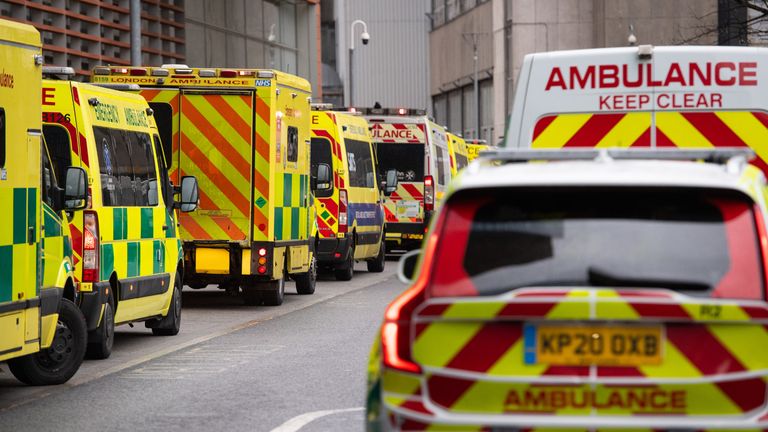Almost half of ICU staff have turned to alcohol or had suicidal thoughts during pandemic
Almost half of intensive care workers have turned to alcohol or had suicidal thoughts during the coronavirus pandemic, a new study suggests.
The research shows that 45% of ICU staff polled met the clinical threshold for at least one of the following: post-traumatic stress disorder (PTSD), severe anxiety or depression and problem drinking.
One in eight (13%) said they had experienced frequent thoughts of “being better off dead” or hurting themselves within the past two weeks.
The study, published in the Occupational Medicine journal, surveyed 709 healthcare workers from nine intensive care wards across England in June and July 2020, but has not yet been peer reviewed.
It also indicated that nurses suffered worse mental health implications than doctors during the first wave of the crisis.
Subscribe to the Daily podcast on Apple Podcasts, Google Podcasts, Spotify, Spreaker
The lead author of the study, Professor Neil Greenberg of the KCL Institute for Psychiatry, said the mental health implications of the pandemic on NHS staff are “highly likely to impair ability to provide high quality care”.
He said the high mortality rate of COVID-19 and challenges around communication with next of kin and end-of-life care due to visiting restrictions in hospitals were among the highest stress factors among intensive care staff.
Currently there are more than 35,000 people in hospital with coronavirus in the UK – and more than 3,300 on ventilators.
Doctors and nurses working on COVID wards, particularly those in London where rates are highest, have said they are at breaking point as admissions continue to rise.
The government is reported to be considering tightening lockdown rules in England even further in a bid to take pressure off the NHS.
Professor Greenberg said that while the results of his new study were not surprising, “they should serve as a stark reminder to NHS managers of the pressing need to protect the mental health of ICU workers now in order to ensure they can deliver vital care to those in need”.

Queues of ambulances outside an NHS hospital as COVID admissions spiral
Dame Donna Kinnair, chief executive of the Royal College of Nursing (RCN), added: “The nurses I speak to every day tell me that they have no fuel left in the tank and their resilience is being seriously tested.
“Nursing staff need help now to deal with unimaginable levels of anxiety and stress, but there must also be a long-term plan to tackle problems, like PTSD, which may reoccur over many years.”
Separate data shows that the number of doctors seeking psychiatric help through their union the British Medical Association (BMA) has increased since the pandemic began.
A total of 371 doctors accessed the BMA’s helpline in November – up from 251 the previous January – an increase of almost 50%.
An NHS spokeswoman said: “This is an incredibly tough time for NHS staff working on the front line which is why we have invested £15m in support, including 38 local mental health and wellbeing hubs and a service for staff with complex mental health needs, such as trauma and addiction.”
Howard Catton, chief executive of the International Council of Nurses, said: “We’ve gathered evidence from right around the world of the mental health and physical impact on nurses and healthcare workers.
“Stress and anxiety symptoms being reported at 80-90 per cent. Nurses fearful of going to work suffering from depression.
“Tragically, some suicides and now the numbers of nurses we know have died in 59 countries around the world stands at 2,262.
“This is a global phenomena that’s resulting in what we’re calling a mass trauma on our nursing workforce.”
The post Almost half of ICU staff have turned to alcohol or had suicidal thoughts during pandemic appeared first on World Weekly News.
